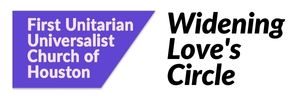Our UU Principles
Unitarian Universalist congregations affirm and promote eight principles, which we hold as strong values and moral guides. As Rev. Barbara Wells ten Hove explains, “the principles are not dogma or doctrine, but rather a guide for those of us who choose to join and participate in Unitarian Universalist religious communities.”
The eight UU Principles are:
1) The inherent worth and dignity of every person;
2) Justice, equity and compassion in human relations;
3) Acceptance of one another and encouragement to spiritual growth in our congregations;
4) A free and responsible search for truth and meaning;
5) The right of conscience and the use of the democratic process within our congregations and in society at large;
6) The goal of world community with peace, liberty, and justice for all;
7) Respect for the interdependent web of all existence of which we are a part.
8) Journeying toward spiritual wholeness by working to build a diverse multicultural Beloved Community by our actions that accountably dismantle racism and other oppressions in ourselves and our institutions.
We live out these Principles within a “living tradition” of wisdom and spirituality, drawn from sources as diverse as science, poetry, scripture, and personal experience:
Direct experience of that transcending mystery and wonder, affirmed in all cultures, which moves us to a renewal of the spirit and an openness to the forces which create and uphold life;
Words and deeds of prophetic women and men which challenge us to confront powers and structures of evil with justice, compassion, and the transforming power of love;
Wisdom from the world’s religions which inspires us in our ethical and spiritual life;
Jewish and Christian teachings which call us to respond to God’s love by loving our neighbors as ourselves;
Humanist teachings which counsel us to heed the guidance of reason and the results of science, and warn us against idolatries of the mind and spirit;
Spiritual teachings of earth-centered traditions which celebrate the sacred circle of life and instruct us to live in harmony with the rhythms of nature.
These eight Principles and six Sources of the Unitarian Universalist Association (UUA) grew out of the grassroots of our tradition, were affirmed democratically, and are part of who we are.
